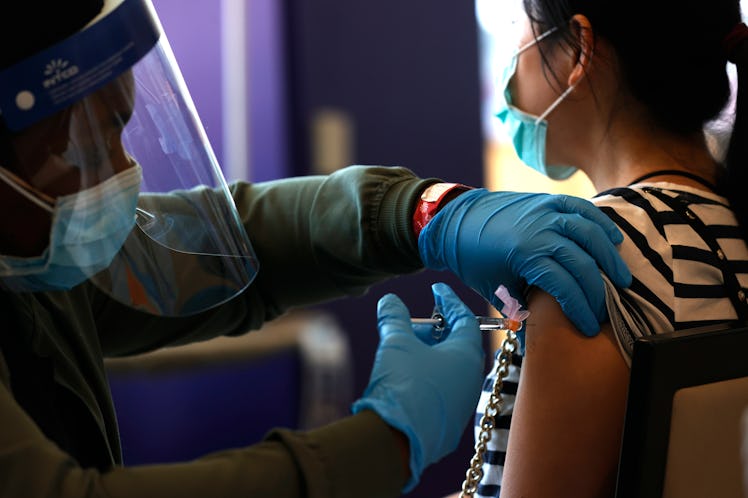
Great, The More Contagious COVID Strain Is Now The "Most Common" In The U.S.
As the COVID-19 pandemic continues to wreak havoc across the country, it seems like states can't administer vaccines fast enough to keep up with the mutating virus. Several COVID variants have made their way to America, with one in particular proving to be more dangerous, and possibly more deadly to young people. According to health officials, the more contagious B-117 COVID variant is now the most common strain in the United States, meaning the nation is now facing a race against time to administer vaccinations, stall the variant, and slow the spread.
CDC Director Rochelle Walensky updated the public on Wednesday, April 7, at a White House briefing on the coronavirus. "Based on our most recent estimates from CDC surveillance, the B-117 variant is now the most common lineage circulating in the United States," she told reporters. Per CDC data, as of April 6, there were more than 16,000 reported cases of the B-117 variant in the United States.
Now, public health experts are concerned a newer, deadlier surge in COVID cases may tear across the country because of this highly contagious strain. According to multiple reports, the B-117 variant originated from the United Kingdom, and is estimated to be between 50% more infectious than previous strains of the virus found in the United States. This newer strain may also be more contagious among young people, and because of its more virulent nature, it may cause more severe symptoms, and result in more hospitalizations. As of April 8, 559,000 Americans have died from COVID-19, per The New York Times.
As of April 8, the Centers for Disease Control and Prevention (CDC) report five states account for 44% of all new cases in the country: Michigan, Pennsylvania, New York, New Jersey, and Florida. Scientists point to increased international travel, as well as lifted COVID-19 restrictions for youth sports, schools, and day care centers as reasons for the spread, according to ABC News.
Thankfully, studies show vaccines are still just as effective against the B-117 variant. However, this variant is significantly more likely to spread through children, who aren't yet authorized to receive any type of vaccine against COVID. As of April 8, vaccine producers are still staging clinical trials for children between the ages of 12 to 15 years old.
States are continuing to administer vaccines, and the percentage of fully vaccinated people is steadily rising. As of April 8, more than 64.4 million people have been fully vaccinated in the United States, and over 171 million doses have been doled out, per Our World In Data. While these numbers certainly suggest meaningful advancements, the number of fully vaccinated individuals still only amounts to 19.6% of the U.S. population. To achieve herd immunity in America, public health experts say 70% to 90% of the population must be fully vaccinated. And even if you're fully vaccinated, the CDC still recommends following proper COVID safety procedures, such as wearing masks and social distancing in public places.
"The virus still has hold on us, infecting people and putting them in harm's way," Walensky said at the briefing. She urged Americans to get vaccinated as soon as possible. "We need to remain vigilant," she added.